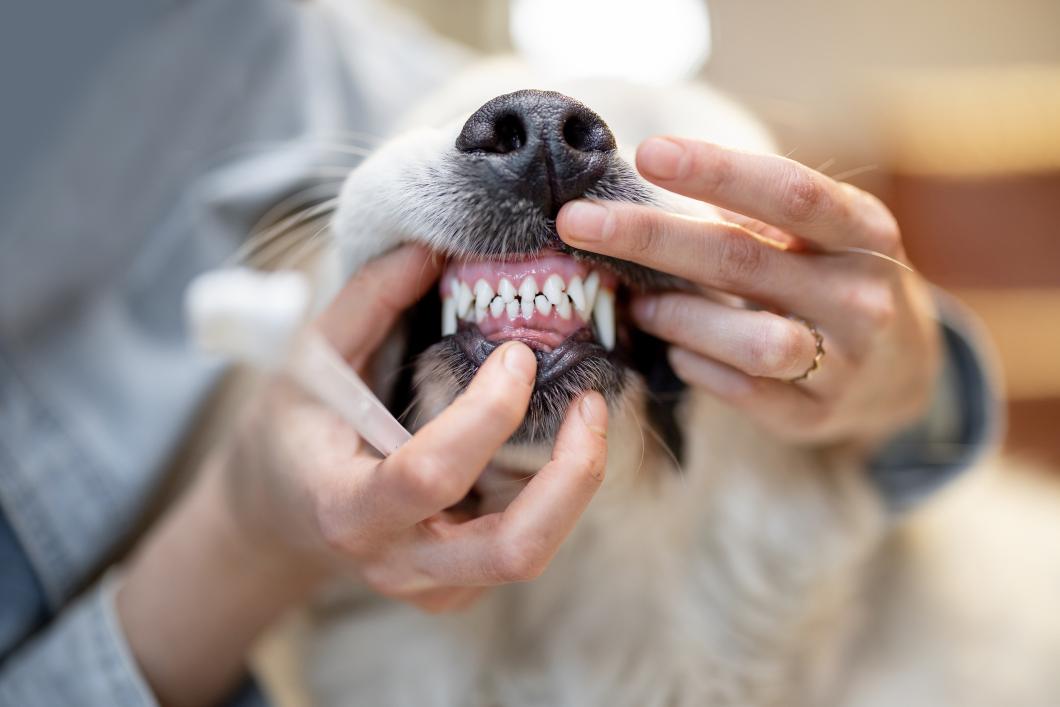Blog
Dental Care for Senior Pets

It’s no secret that older pets are vulnerable to a variety of health conditions. In addition to the possibility of developing arthritis, diabetes, or kidney disease, senior pets are at higher risk of dental disease. In fact, the majority of pets over age three show some evidence of periodontal disease. The fact that senior pets have concurrent medical conditions can make it harder to tend to their teeth, but the positive impact of dental care on overall senior wellness is worth talking about.
Preventing Dental Disease
While it might be easier to train younger animals to withstand a well-intentioned tooth brushing session, all pets regardless of age can learn to accept brushing as a fun, rewarding experience.
The reasons we stress pet dental care at home start and end with plaque and tartar. Formed by oral bacteria and undigested food particles, plaque eventually calcifies into tartar, or dental calculus. The combination of plaque and tartar leads to inflammation, infection, pain, and eventual tooth loss. What’s worse, oral bacteria can seep into the bloodstream where it travels to the heart, kidneys and liver, causing disease.
We are happy to show you the best methods for at-home senior pet dental care, and suggest a variety of products that support dental health, including chews, treats, rinses, wipes, and more.
Senior Pet Dental Care
At every wellness exam, or every 6-12 months depending on health history, we look inside the mouth for any evidence of dental disease, including these signs:
- Yellow-brown discoloration of the teeth
- Red, swollen, bleeding gums
- Bad breath
- Loose teeth
- Broken, cracked, or missing teeth
- Drooling
A dental cleaning under anesthesia begins with X-rays to see below the gum line before scaling the teeth to remove tartar build-up, cleaning, and polishing of the teeth. Antibiotic or anti-inflammatory medication may be necessary to combat infection and inflammation. We strive to save as many teeth as possible, but may recommend extractions, when necessary, to mitigate further decline and pain.
Taking Extra Care
There are risks to anesthesia, we mitigate this risk through pre-op labwork prior to the procedure, to achieve optimal safety and comfort during dental cleanings. Additionally, closely monitoring the patient’s vital signs is tremendously important during all procedures and our team of doctors and technicians are highly skilled and capable. Patients with pre-existing health conditions and requiring extra special care may be referred to a local dental specialist.
Beneath the Surface
Since the full extent of damage caused by periodontal disease occurs beneath the gum line, we use digital radiographs to learn what we cannot see. Images can reveal changes to the tooth and root structure, as well as the architecture of surrounding bones. If any loss of bone is noted, we can determine the stage of periodontal disease, and create an effective treatment plan.
Look No Further
While periodontal disease is progressive and irreversible, it’s never too late to start making changes that promote dental health. In order for a pet to truly experience optimal health, their teeth and gums must be in tip-top shape.
Our doctors are always here to help you with questions or concerns about senior pet dental health. Please call South Seminole Animal Hospital at (407) 831‑5205 for more information.
